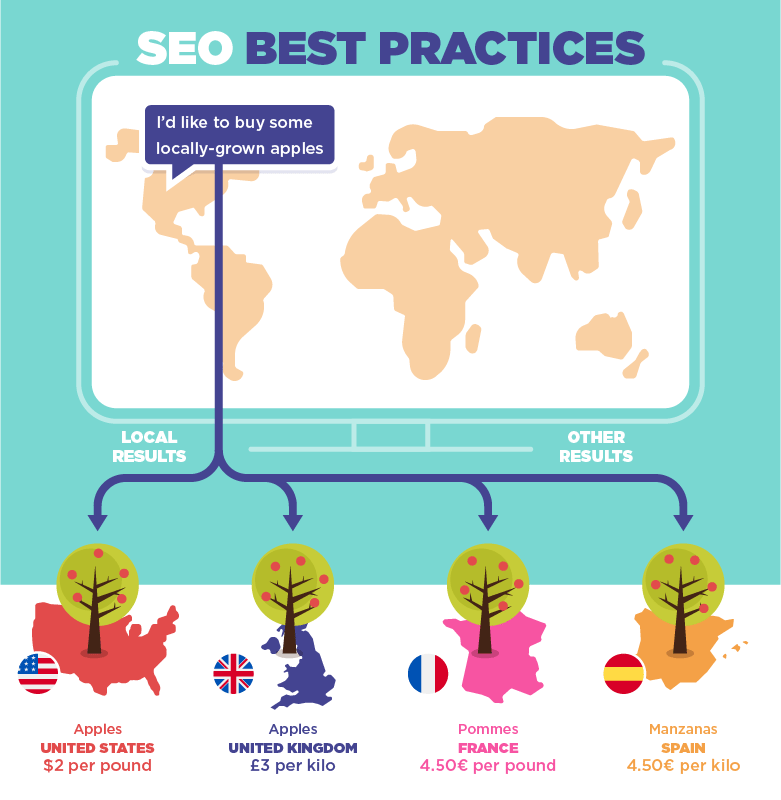Cracking the Code of International SEO: A Comprehensive Overview
Cracking the Code of International SEO: A Comprehensive Overview
Blog Article
Navigating the Digital Landscape: Leveraging International Search Engine Optimization for Cross-Border Success
In today's interconnected digital globe, businesses are significantly looking past boundaries to tap right into worldwide markets. The complexity of navigating the electronic landscape on a global scale requires a nuanced method, from understanding the fundamentals of International SEO to executing geotargeting and multilingual keyword phrase approaches.
Comprehending International SEO Principles
Browsing the complexities of global SEO needs a solid understanding of essential concepts to successfully increase on the internet visibility throughout boundaries. One essential aspect of international SEO is understanding the significance of localization.
Furthermore, having a clear understanding of geo-targeting is essential. This includes suggesting to online search engine the details nations or areas a website is targeting. Executing hreflang tags is one way to communicate this details, making certain that the right version of a web page shows up in the search results page for a customer in a certain area.
Additionally, understanding the effect of local internet search engine and social networks systems is important for worldwide search engine optimization success. As an example, while Google is leading in lots of regions, nations like China have their own internet search engine like Baidu, requiring tailored approaches for each platform to take full advantage of on the internet exposure.

Targeting Multilingual Key Words Methods
Creating multilingual keyword phrase strategies is important for efficiently getting to varied international target markets and optimizing online presence throughout different etymological areas. When targeting multilingual keyword strategies, it is critical to perform thorough research study to comprehend the details search terms and expressions used by the target audience in each linguistic region. This includes not only equating search phrases yet additionally thinking about cultural subtleties, regional languages, and search trends special to every target market.
To develop an effective multilingual keyword strategy, it is essential to prioritize importance and search intent. Key words need to straighten with the web content on the site and reverberate with the social context of the target market. Making use of devices such as Google Keyword Phrase Coordinator, SEMrush, or Ahrefs can assist recognize high-performing search phrases in various languages and evaluate their search quantity and competitors degree.
In addition, tracking and evaluating the performance of multilingual key words regularly is important for enhancing and improving the strategy with time. By constantly adjusting to adjustments in search actions and trends, organizations can improve their online visibility and bring in even more international website traffic to their sites.
Implementing Geotargeting and Hreflang Tags
When aiming to enhance worldwide SEO techniques, integrating geotargeting and hreflang tags is crucial for optimizing website presence across different regions. Geotargeting involves tailoring content to specific places, making certain that individuals in Our site different locations obtain pertinent information. By carrying out geotargeting, companies can enhance their local search positions and attract region-specific website traffic.

Optimizing Web Site Structure for International Exposure
To additionally improve global Search engine optimization methods beyond geotargeting and hreflang tags, optimizing the web site structure is crucial for achieving worldwide visibility and maximizing reach throughout different areas. A well-structured website not only boosts customer experience but also promotes search engine spiders in understanding the content and context of the website.
In addition, creating language-specific subdirectories or subdomains can assist search engines supply the best variation of the website to users based upon their language preferences, better improving the general individual experience. Furthermore, optimizing link structures to include pertinent search phrases and geotargeted terms can boost the website's exposure in various areas. By structuring the site successfully for international target markets, businesses can boost their possibilities of bring in international website traffic and expanding their reach throughout boundaries.

Monitoring and Assessing Cross-Border Efficiency
Effective surveillance and analyzing of cross-border performance is necessary for assessing the success of global search engine optimization methods and identifying possibilities for enhancement in global reach and visibility. By carefully tracking key efficiency indicators (KPIs) across different markets, businesses can gain beneficial insights into the effectiveness of their cross-border search engine optimization initiatives. Monitoring metrics such as organic website traffic, keyword rankings, conversion prices, and my latest blog post bounce prices can offer an extensive view of just how well a website is carrying out in numerous regions.
By comparing performance throughout various nations, areas, or languages, firms can identify effective techniques and localize content to much better cater to details target audiences (International SEO). Regular analysis of Search engine optimization performance on an international range guarantees that firms can adjust their approaches quickly to take advantage of on emerging chances and keep a competitive side in global markets.
Final Thought
Finally, global search engine optimization plays an essential function in achieving cross-border success by enhancing internet sites for international visibility, targeting multilingual key phrase approaches, implementing geotargeting and hreflang tags, and keeping an eye on cross-border performance. By recognizing the basics of worldwide search engine optimization and optimizing site frameworks appropriately, services can efficiently reach and engage with their target audiences across different areas and languages. This calculated technique is crucial for increasing market reach and driving on the internet development in today's electronic landscape.
Report this page